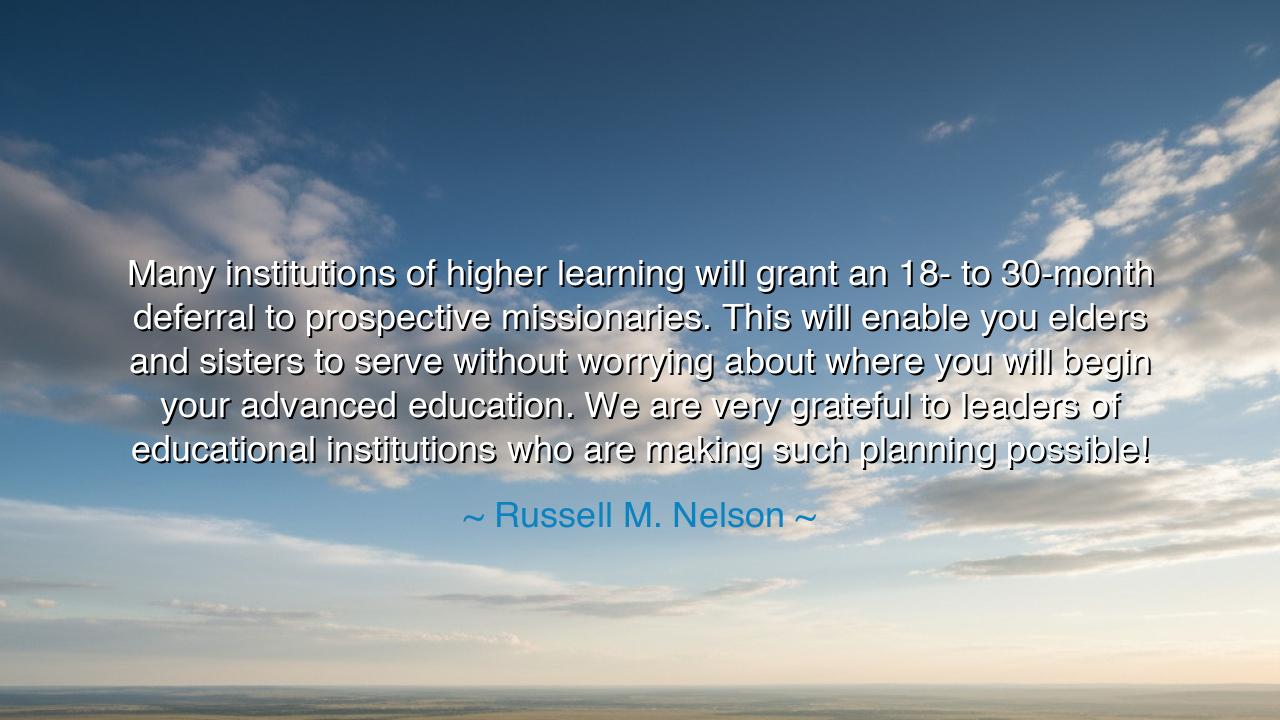
Many institutions of higher learning will grant an 18- to
Many institutions of higher learning will grant an 18- to 30-month deferral to prospective missionaries. This will enable you elders and sisters to serve without worrying about where you will begin your advanced education. We are very grateful to leaders of educational institutions who are making such planning possible!






When Russell M. Nelson, a man of faith and learning, declared, “Many institutions of higher learning will grant an 18- to 30-month deferral to prospective missionaries. This will enable you elders and sisters to serve without worrying about where you will begin your advanced education. We are very grateful to leaders of educational institutions who are making such planning possible!” he was not merely describing a policy of accommodation — he was illuminating a harmony between faith and knowledge, between service and study, between the pursuit of heaven and the pursuit of wisdom. His words carry the quiet majesty of a truth that transcends time: that the mind and the spirit are not enemies, but companions on the path to divine purpose.
The origin of this quote lies within the sacred tradition of missionary service in the Church of Jesus Christ of Latter-day Saints, where young men and women dedicate years of their youth to spreading light, compassion, and truth across the world. For many, this calling arrives at a crossroads — between the hunger for education and the call to spiritual labor. President Nelson, himself a man of science and medicine, understood the tension that can live in such a choice. Thus, his words offer reassurance and order: that the pursuit of learning need not come at the cost of spiritual duty, nor spiritual duty at the cost of learning. Through his voice, the wisdom of faith and reason stand reconciled.
By praising educational institutions that allow such deferrals, Nelson acknowledges a deep truth — that the world grows richer when it allows space for the soul. Education, at its highest form, is not the mere gathering of facts, but the cultivation of character. To defer a place in the halls of academia in order to serve in the field of humanity is not delay, but preparation. A missionary returns not less capable, but more complete — tempered by sacrifice, strengthened by faith, and filled with empathy born from service. The knowledge gained in universities fills the mind; the lessons learned in service fill the heart. And when the two unite, they form a power that can move nations and lift generations.
Consider the life of Nelson himself, who before leading millions in faith was a surgeon of great renown — a man who opened the chambers of the heart, both literally and spiritually. He knew that education without compassion is hollow, and that faith without learning can falter. The missionary who returns to study medicine or law or art brings with them a vision sharpened by humility, patience, and love. They do not see success as mere advancement, but as stewardship — the sacred responsibility to use knowledge in the service of others.
This harmony between faith and intellect has echoed through history. When Isaac Newton studied the universe, he did so not as a skeptic but as a worshiper of creation. When Florence Nightingale healed the sick, she did so not only with skill, but with the devotion of one who saw every human as sacred. So too, the missionaries who pause their education to serve the world return as wiser students and stronger souls, for they have lived the truth that service is itself a form of learning. The greatest lessons are not always written in books, but in the lives we touch.
Nelson’s gratitude toward the leaders of learning carries its own sacred resonance. For these educators, in granting flexibility and faith to their students, participate in something greater than policy — they become partners in the formation of the whole person. In a world that often divides the secular from the spiritual, their cooperation restores balance. They understand that the highest education is that which refines both intellect and virtue. By allowing students to serve before they study, they affirm that wisdom is not measured in grades, but in grace.
The lesson of Nelson’s words is clear and timeless: knowledge and faith are allies in the human journey. To the young, he teaches that service enriches the scholar; to the learned, he reminds that humility guards the mind from pride. The call to serve, whether in missionary work or in the quiet service of daily kindness, is never a detour from success — it is the foundation of it. The student who pauses to lift another will return wiser than the one who races forward without purpose.
So let his words stand as a lamp to guide generations: seek both wisdom and goodness, and never fear that serving others will delay your destiny. For the world honors not those who know the most, but those who use their knowledge to heal, to uplift, and to bless. In the grand university of life, faith and reason are but two wings of the same soul — and only by the strength of both can we rise toward the light.






AAdministratorAdministrator
Welcome, honored guests. Please leave a comment, we will respond soon